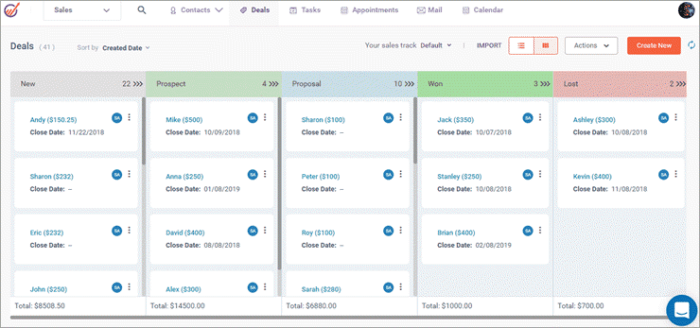Sales management software for small business is revolutionizing how entrepreneurs manage their sales processes. Efficiently tracking leads, automating tasks, and analyzing sales data are no longer luxuries but necessities for staying competitive. This software empowers small businesses to streamline operations, improve customer relationships, and ultimately boost their bottom line, leading to significant growth and increased profitability. The right software can be the key to unlocking a small business’s full sales potential, transforming chaotic processes into efficient, data-driven strategies.
From simple CRM systems to sophisticated sales forecasting tools, the market offers a diverse range of options tailored to various business needs and budgets. Choosing the right fit involves careful consideration of factors like the size of your sales team, the complexity of your sales cycle, and your specific business goals. Understanding these factors allows for a strategic selection that maximizes return on investment and ensures seamless integration with existing workflows.
In today’s competitive landscape, small businesses need every advantage they can get. Efficient sales management is no longer a luxury; it’s a necessity. Fortunately, a wealth of sales management software solutions are available, designed to help small businesses track leads, manage pipelines, boost sales, and ultimately, drive growth. This comprehensive guide will explore the benefits, features, and considerations for selecting the right sales management software for your small business.
We’ll delve into various aspects, from CRM functionalities to sales forecasting and reporting, ensuring you have the knowledge to make an informed decision.

Source: qontak.com
Understanding the Need for Sales Management Software
Before diving into specific software options, let’s clarify why small businesses need dedicated sales management tools. Manually managing sales processes can be time-consuming, error-prone, and inefficient. As your business grows, relying on spreadsheets and email alone becomes unsustainable. Sales management software offers a centralized platform to streamline various aspects of your sales operations, including:
Key Benefits of Sales Management Software for Small Businesses:
- Improved Lead Management: Capture, qualify, and nurture leads more effectively, ensuring no potential customer slips through the cracks. This includes features like lead scoring and lead routing.
- Enhanced Sales Pipeline Visibility: Gain a clear overview of your sales pipeline, track deals at each stage, and identify potential bottlenecks. This allows for proactive intervention and improved forecasting.
- Increased Sales Team Productivity: Automate repetitive tasks, freeing up your sales team to focus on building relationships and closing deals. This includes features like automated email sequences and task management.
- Better Customer Relationship Management (CRM): Store and manage all customer interactions in one place, providing a 360-degree view of each customer. This leads to personalized communication and improved customer satisfaction.
- Data-Driven Decision Making: Access comprehensive sales data and analytics to track key performance indicators (KPIs), identify trends, and make informed business decisions. This includes sales reports, dashboards, and forecasting tools.
- Improved Sales Forecasting: Predict future sales revenue based on historical data and current pipeline activity. This allows for better resource allocation and financial planning.
- Enhanced Collaboration: Improve communication and collaboration within your sales team and across departments. This includes features like shared calendars and team communication tools.
Choosing the Right Sales Management Software: Key Features to Consider
The market offers a wide range of sales management software solutions, each with its own set of features and pricing. Choosing the right one depends on your specific needs and budget. Here are some key features to consider:
Essential Features:, Sales management software for small business
- Contact Management: Robust contact management capabilities are crucial for storing and organizing customer information, including contact details, interaction history, and purchase history.
- Lead Management: Effective lead management features are essential for capturing, qualifying, and nurturing leads. Look for features like lead scoring, lead routing, and lead nurturing workflows.
- Sales Pipeline Management: Visualize your sales pipeline with clear stages and track the progress of each deal. This allows for better monitoring and management of the sales process.
- Reporting and Analytics: Access comprehensive sales data and analytics to track key performance indicators (KPIs) and identify areas for improvement. Look for customizable dashboards and reports.
- Integration Capabilities: Ensure the software integrates with other essential business tools, such as your email marketing platform, accounting software, and customer support system. Seamless integration streamlines workflows and improves efficiency.
- Mobile Accessibility: Access your sales data and manage your sales activities from anywhere, anytime, with a mobile-friendly interface.
- Customization Options: Choose software that can be customized to fit your specific business needs and workflows. This ensures the software aligns with your processes rather than forcing you to adapt to its limitations.
Top Sales Management Software Options for Small Businesses: Sales Management Software For Small Business
Several excellent sales management software options cater specifically to the needs of small businesses. The best choice will depend on your specific requirements and budget. Some popular options include (note: this is not an exhaustive list, and specific features and pricing may vary):

Source: cloudfront.net
- HubSpot CRM: A popular and widely-used free CRM with powerful features, ideal for smaller businesses starting out.
- Zoho CRM: A comprehensive and affordable CRM solution with a wide range of features suitable for growing businesses.
- Salesforce Sales Cloud (Essentials): A scaled-down version of the powerful Salesforce platform, offering core CRM functionalities at a more affordable price point for smaller businesses.
- Pipedrive: A user-friendly sales CRM focused on pipeline management, making it a great option for sales-driven businesses.
- Freshsales: A modern and intuitive CRM known for its ease of use and powerful automation features.
Remember to thoroughly research each option, compare features, and consider free trials or demos before making a decision.
Implementing and Optimizing Your Sales Management Software
Implementing new software requires careful planning and execution. Here are some tips for successfully implementing and optimizing your chosen sales management software:
- Proper Training: Ensure your sales team receives adequate training on how to use the software effectively. This will maximize adoption and minimize frustration.
- Data Migration: If migrating data from existing systems, ensure a smooth and accurate transfer to avoid data loss or inconsistencies.
- Process Optimization: Align your sales processes with the software’s capabilities to maximize efficiency and streamline workflows.
- Regular Monitoring and Reporting: Track key performance indicators (KPIs) and regularly review your sales data to identify areas for improvement.
- Continuous Improvement: Sales management software is an ongoing process. Regularly assess your needs and adapt your software usage to maximize its benefits.
Frequently Asked Questions (FAQ)
- Q: How much does sales management software cost? A: The cost varies greatly depending on the software, features, and number of users. Some offer free plans, while others charge monthly or annual subscriptions, ranging from a few dollars to hundreds of dollars per month.
- Q: Is sales management software right for my small business? A: If you’re struggling to manage your sales processes efficiently, experiencing difficulties tracking leads, or lacking visibility into your sales pipeline, then sales management software can significantly benefit your business.
- Q: How long does it take to implement sales management software? A: The implementation time varies depending on the complexity of the software and the size of your business. It can range from a few days to several weeks.
- Q: What are the key benefits of using a CRM for sales? A: A CRM centralizes customer information, improves communication, enhances customer relationships, and provides valuable data for decision-making.
- Q: Can sales management software help with sales forecasting? A: Yes, many sales management software solutions include sales forecasting tools that utilize historical data and pipeline activity to predict future sales revenue.
Conclusion
Investing in the right sales management software is a crucial step for any small business looking to streamline operations, improve efficiency, and drive growth. By carefully considering your needs, researching available options, and implementing the software effectively, you can unlock the full potential of your sales team and achieve sustainable business success. Remember to choose software that aligns with your budget and future scaling plans.
Call to Action
Ready to take your sales management to the next level? Explore the options mentioned above and choose the best fit for your small business. Start your free trial today and experience the difference!
In conclusion, implementing the right sales management software can be a game-changer for small businesses. By streamlining sales processes, enhancing customer interactions, and providing valuable data-driven insights, these tools empower entrepreneurs to make informed decisions, optimize their strategies, and achieve sustainable growth. The investment in such software is not merely an expense but a strategic move towards building a more efficient, profitable, and scalable business.
The future of small business sales is undoubtedly intertwined with the effective utilization of these powerful technologies.
FAQ Insights
What are the key features to look for in sales management software?
Essential features include contact management, lead tracking, sales pipeline visualization, reporting and analytics, and integration with other business tools.
How much does sales management software typically cost?
Pricing varies widely depending on features, scalability, and vendor. Options range from free plans with limited functionality to enterprise-level solutions with substantial monthly fees.
How long does it take to implement sales management software?
Implementation time depends on the software’s complexity and your team’s technical expertise. Simpler systems can be implemented quickly, while more complex ones may require more time and training.

Source: softwaretestinghelp.com
What if my business doesn’t have a large sales team? Is this software still relevant?
Absolutely. Even solopreneurs and small teams benefit from the organization and efficiency provided by sales management software. It simplifies tasks and allows for better tracking of leads and sales.